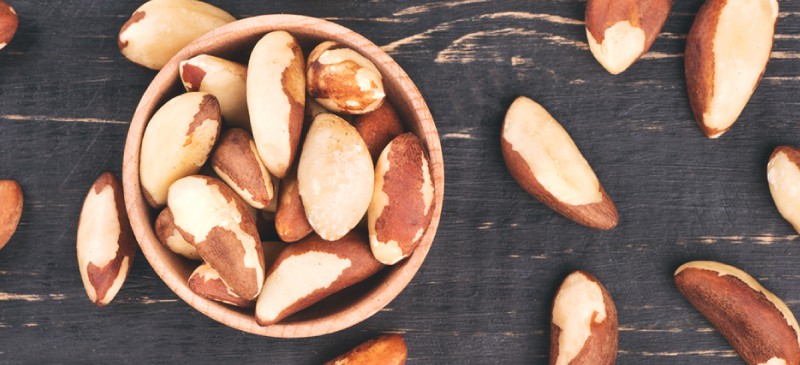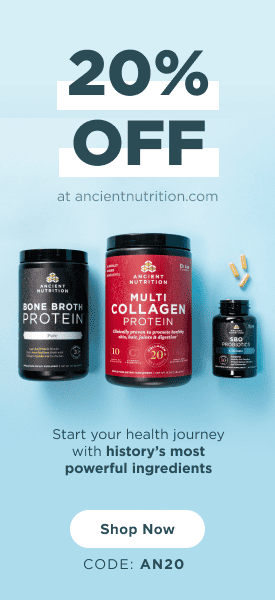This Dr. Axe content is medically reviewed or fact checked to ensure factually accurate information.
With strict editorial sourcing guidelines, we only link to academic research institutions, reputable media sites and, when research is available, medically peer-reviewed studies. Note that the numbers in parentheses (1, 2, etc.) are clickable links to these studies.
The information in our articles is NOT intended to replace a one-on-one relationship with a qualified health care professional and is not intended as medical advice.
This article is based on scientific evidence, written by experts and fact checked by our trained editorial staff. Note that the numbers in parentheses (1, 2, etc.) are clickable links to medically peer-reviewed studies.
Our team includes licensed nutritionists and dietitians, certified health education specialists, as well as certified strength and conditioning specialists, personal trainers and corrective exercise specialists. Our team aims to be not only thorough with its research, but also objective and unbiased.
The information in our articles is NOT intended to replace a one-on-one relationship with a qualified health care professional and is not intended as medical advice.
Top 15 High-Selenium Foods (Plus Their Benefits)
August 23, 2019

Selenium is an essential trace mineral for humans, meaning we should all be getting enough from our diets every day through the consumption of selenium foods.
What is selenium good for in the body? It has both antioxidant and anti-inflammatory effects, especially because it’s required for the creation of glutathione, considered your body’s master antioxidant.
For this reason, research suggests that consuming foods high in selenium can support detoxification and liver function, as well as hormonal and thyroid health.
What types of foods provide selenium?
Because it’s naturally found in soil and then transported into plants as they grow through special membranes within their roots, some plants, especially nuts, nuts and beans, can be such great sources of selenium in the diet. Meats, fish and eggs are other rich sources.
Top Health Benefits
- Antioxidant and Anti-Inflammatory Effects — It has the ability to fight the aging process and help the immune system by reducing free radical damage and oxidative stress. There is evidence that selenium benefits include not only being able cut cancer risk, but also help to slow down existing cancer progression and tumor growth.
- Improved Thyroid Health — Selenium plays a role in maintaining thyroid health since it works together with iodine. In fact, the thyroid is the organ in our bodies with the largest content of selenium. It’s needed to produce a critical thyroid hormone called T3, which regulates metabolism. Selenium deficiency is known to lower the synthesis of thyroid hormones.
- Cancer Prevention — There is a strong correlation between levels of selenium in the blood and a reduced risk of several types of cancer. Selenium may help with DNA repair or may prevent cancer cells from replicating. Since it is a powerful antioxidant, it makes sense why foods high in selenium may help to prevent cancer by reducing free radicals in the body.
- Heart Health — Selenium-rich foods prevent oxidative damage to the body’s cells reducing inflammation and lowering the risk of cardiovascular disease. Some people with low levels of serum selenium have been shown to be at higher risk of cardiovascular disease.
- Fertility Support — Selenium is required for proper sperm motility and also increases blood flow. Consuming plenty has been shown to be helpful during pregnancy-related thyroid problems like postpartum thyroiditis as well as Graves’ disease.
- Help Treating Asthma — Experts think that selenium supplementation may be a useful add-on treatment to medication for patients with chronic asthma.
Top 15 High-Selenium Foods
What foods are rich in selenium? There are a lot of healthy and delicious selenium-rich foods to choose from.
According to the USDA, below is a list of high-selenium foods:
- Brazil nuts
- Salmon
- Tuna
- Turkey
- Cottage cheese
- Chicken
- Mushrooms
- Halibut
- Eggs
- Navy beans
- Sardines
- Sunflower seeds
- Grass-fed beef
- Oats
- Beef Liver
- Tofu
1. Brazil nuts
1 kernel (5 grams): 95.9 micrograms (over 100 percent DV)
Brazil nuts’ selenium content is amazing, isn’t it? When it comes to selenium foods for vegetarians and selenium foods vegan can eat, Brazil nuts are without a doubt a top choice. It only takes one or two nuts (depending on their size) a day to meet most people’s daily needs.
In addition, as one of the top healthiest nuts, a small clinical study published in 2013 in the Journal of Nutrition and Metabolism found that eating a single serving of Brazil nuts can lower LDL (“bad” cholesterol) and raise HDL (“good cholesterol) in healthy subjects.
2. Wild-caught salmon
3 ounces: 40 micrograms (57 percent DV)
Salmon nutrition makes it one of healthiest foods on the planet (of course, just make sure it’s wild-caught), thanks to its supply of omega-3 fatty acids, protein, minerals and more,
3. Tuna
3 ounces: 33 micrograms (44 percent DV)
Yellowfish tuna is especially rich in this trace element. When buying tuna, look for tuna caught through Pacific troll or pole and line methods to get the lowest mercury option.
4. Turkey
3 ounces: 24 micrograms (36 percent DV)
Don’t forget about turkey until next Thanksgiving. This bird is an excellent protein-rich source of this mineral, as well as the calm-inducing amino acid known as tryptophan.
5. Cottage cheese
1 cup: 22 micrograms (32 percent DV)
In addition to this trace element, cottage cheese is a great source of protein and calcium.
6. Chicken
3 ounces: 21 micrograms (30 percent DV)
Always opt for organic free-range chicken to get the healthiest version of this high-protein food.
7. Mushrooms, cooked
1 cup: 19 micrograms (27 percent DV)
Mushrooms make a great vegetarian- and vegan-approved source of this mineral and many other essential nutrients.
8. Halibut, cooked with skin
3 ounces: 17 micrograms (24 percent DV)
There are pros and cons of halibut fish, but the fact that this fish is a selenium-rich seafood option is definitely a pro.
9. Eggs
1 large: 15 micrograms (22 percent DV)
When it comes to foods high in selenium and iodine, eggs definitely make the list. If possible, opt for organic eggs produced by free-range hens.
10. Navy beans
1 cup: 15 micrograms (22 percent DV)
Loved by many vegetarians and vegans as an excellent plant-based source of protein, navy beans also contain an impressive amount of folate, manganese and selenium.
11. Sardines
1 ounce: 15 micrograms (21 percent DV)
Sardines nutrition are a great source of this mineral as well as essential fatty acids, which are known for their anti-inflammatory benefits. Essential fatty acids also play an important role in the body when it come to cell signaling, immunity, mood and brain health.
12. Sunflower seeds
1 ounce: 15 micrograms: (21 percent DV)
Another plant-based source of selenium is sunflower seeds, which are great to snack on by themselves. You can also add to them to salads, homemade veggie burgers, meatballs and more.
13. Grass-fed beef, ground
3 ounces 12 micrograms (18 percent DV)
Grass-fed beef is a food rich in selenium and zinc as well as many other vital nutrients. It’s also a great source of conjugated linoleic acid.
14. Oats, old-fashioned, not fortified
1 cup: 13 micrograms (18 percent DV)
Oats contain soluble fiber which is known to help lower LDL cholesterol also known as “bad” cholesterol.
15. Beef liver
1 ounce: 10 micrograms (14 percent DV)
Is liver good for you? If you can learn to enjoy (or mask) the taste, many people love beef liver for its high nutrient content.
16. Tofu
100 grams: 13 micrograms (24 percent DV)
Tofu is a great protein food, along with providing other key micronutrients like manganese, calcium and selenium. Each serving is also low in tofu calories, with just 70 calories in 100 grams.

What fruits and vegetables are high in selenium? You can see from the list below that some of the top plant sources is mushrooms.
Other food sources include spinach, bananas, peaches, carrots, green beans and potatoes.
Related: What Is Tripe Meat? 4 Reasons to Eat This Offal
Recipes
In order to be sure you get enough selenium in your diet, aim to incorporate a variety of foods with selenium into your meals. Here are some mouth-watering recipes that include plenty of this trace element:
- Grilled Burgers and Vegetables Recipe
- Creamy Cauliflower, Carrot and Brazil Nut Soup
- Baked Eggs and Spinach Recipe
- Turkey Stir-Fry Recipe
Risks and Side Effects
You may be wondering how much selenium you need per day? Needs vary depending on your age and health status.
For adults and children four years of age and older, the current daily recommendation is 55 micrograms per day. For pregnant and breastfeeding women, the recommendation is 70 micrograms per day.
Can you have too much selenium?
Eating selenium foods is not a concern in regards to overdosing. However ,supplementing can be problematic if you take too much.
Chronically high intakes from supplements can lead to unwanted side effects. Some early signs of of excess intake include bad breath (specifically a garlic odor) and a metallic taste in the mouth, while other symptoms may include skin lesions and rashes, nausea, diarrhea, fatigue, irritability and nervous system abnormalities.
As long as you eat a variety of foods with selenium regularly, there is probably no need to supplement. However, if you suspect you may be deficient, speak to your doctor about safely supplementing.
Final Thoughts
- Consuming selenium foods regularly is the best and safest way to ensure that you are getting enough of this vital nutrient in your diet. Aim to consume about two to three high-selenium foods daily to improve detoxification, immunity and thyroid function.
- Selenium foods include Brazil nuts, eggs, a variety of meats, fish, some plants and other seeds/nuts.
- Health benefits of eating these foods include a boost to your immune system, metabolism, fertility and thyroid health. These benefits are linked more to dietary intake rather than selenium supplements.












